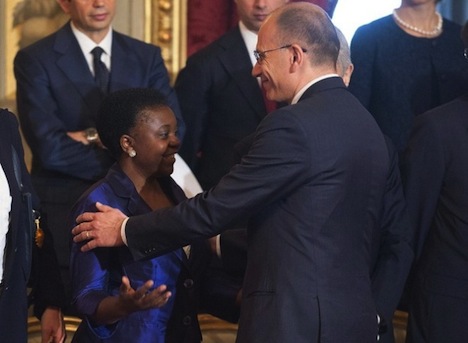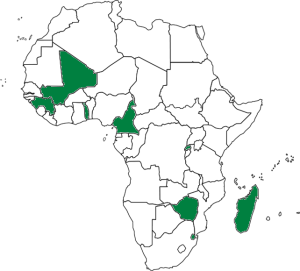It seems like barely a week goes by without another story coming out of Italy about another racial slur hurled at the Mediterranean country’s first black government minister, Cécile Kyenge. ![]()
This week’s row comes from Roberto Calderoli, a member of the Lega Nord (Northern League), the autonomist right-wing party that has in the past allied itself with Silvio Berlusconi, though it’s not part of the current ‘grand coalition’ led by center-left prime minister Enrico Letta.
Calderoli, speaking over the weekend, railed against Kyenge, arguing that her success encourages ‘illegal immigrants’ to come to Italy, that she should be a minister ‘in her own country,’ and added this gem:
“I love animals – bears and wolves, as everyone knows – but when I see the pictures of Kyenge I cannot but think of, even if I’m not saying she is one, the features of an orangutan,” Mr Calderoli said in a speech to a rally in the northern city of Treviso on Saturday.
Calderoli’s comments were unthinkably crass but, unfortunately, they are not atypical in the three months since Kyenge came to power, nor are they incredibly out of the norm for a political culture that has long treated racism with a wink and a smile, such as when Berlusconi himself described Barack Obama, the first black president of the United States, as particularly ‘suntanned.’
Kyenge (pictured above with Letta), an Italian citizen who was born in Congo, came to Italy in 1983, when she set up a practice as a doctor in Modena, in the central Italian region of Emilia-Romagna. Earlier this year, she was first elected to Italy’s Camera dei Deputati (Chamber of Deputies) as a member of Italy’s center-left Partito Democratico (PD, Democratic Party). Letta appointed her as the government’s minister for integration, in part due to the work Kyenge has done since founding DAWA, an association designed to promote multicultural awareness in Italy and to foster cooperation between Italy and Africa. Prior to becoming an Italian deputy, Kyenge served as a provincial councilor in Modena for four years, and she’s a proponent of a jus soli, a law that would grant citizenship to those children of immigrants who are born in Italy.
In short, Kyenge personifies a new kind of 21st century success story for first- and second-generation Europeans in a world where globalized ties are now bound to blur ethnic, racial, national and cultural borders.
It’s worth bearing in mind that this isn’t the first time Calderoli has been accused of racism or insensitivity. He was forced to resign as a minister in a previous Berlusconi government in 2006 after purporting to wear a t-shirt showing the printed cartoons of a Danish newspaper depicting the prophet Mohammed. (Having returned to a subsequent Berlusconi government a few years later, it was Calderoli who drafted the election law that now virtually everyone in Italy agrees is worthless).
Nor is it the first time Northern League politicians have made controversial statements about Kyenge — one of its local politicians earlier in June called for Kyenge to be raped, so she would understand how victims feel, and in April, another European Parliament member, Mario Borghezio, called her part of a ‘bonga, bonga government’ and argued that she wanted to ‘impose her tribal traditions from the Congo.’
Kyenge has accepted Calderoli’s begrudging apology, but it’s not even the only incident this week — members of the far-right Forza Nuova (New Force) party held an anti-immigration protest featuring nooses in Pescara in central Italy.
In the long run, it may well be that Kyenge’s graceful responses to unacceptably mean-spirited and racist comments convince more Italians that there’s no place for racism in Italian public discourse — she has the power to turn ugly incidents like Calderoli’s slur into what Obama himself might call a ‘teachable moment.’
But that task is made equally difficult by the integration portfolio that Kyenge holds, which means that she is responsible for policymaking on immigration and the nearly 4.5 million foreign residents who live in Italy. Even as Kyenge tries to deflect tensions, Calderoli and other Northern League politicians may be using outbursts about Kyenge as a deliberate strategy to inject racial resentment as a potent political wedge issue.
Although migrants have been coming to Italy since the 1970s, which makes immigration to Italy a more recent phenomenon than in other European countries, about two-thirds of Italy’s current foreign residents have arrived in the past decade. The net result is a country that hasn’t had time to develop the political or cultural institutions to cope with a very rapid influx of foreigners, let alone to develop the vocabulary of multiculturalism in a country that can be sometimes quite insular in a way that’s both profound and provincial, troubling and quaint Continue reading Italy’s problem with racism goes far deeper than recent slurs against Cécile Kyenge


